The Verbal Ability section of the ICFAI Business School Aptitude Test (IBSAT) evaluates a candidate’s command over the English language. It includes questions on grammar, vocabulary, sentence correction, idioms, and verbal reasoning, designed to assess accuracy, comprehension, and effective communication skills crucial for management studies.
IBSAT Verbal Ability Sample Paper with Answer Key PDF
| IBSAT Verbal Ability Sample Paper PDF | Download PDF | Check Solutions |
IBSAT Verbal Ability Question Paper with Solutions
The _________ was that the cheaper the _________ rate the better it is for the industry.
Chances are that your _________ income from investments will get _________.
The government has to increase its _________ to meet the _________ expenditure.
Under the act, _________ gains tax is _________ on both long term and short term gains.
The _________ can also decide whether the interest should be _________ or annual.
Stock markets may yield good _________, but _________ is far greater.
The true test of civilization is not the census, not the size of cities nor the crops, but the kind of _________ the country _________ out.
People learn something everyday, and a lot of times it's that what they _________ the day before was _________.
You can't expect a person to see eye to eye with you when you are _________ on him.
One must submit to a _________ of private liberty in order that one may enjoy a social order, which makes one's liberty a _________.
We may think that our thoughts are only for _________, but unconsciously they _________ other lives, richly or adversely.
Orator: Speech ::
Ring: Finger ::
Throw: drop ::
View Solution
Step 1: Understanding the Relationship
The relationship between Throw and drop is that they are two related actions of releasing an object. To "throw" is to release with force, while to "drop" is to release without force. They represent a pair of similar actions with a difference in intensity or manner.
Step 2: Analyzing the Options
We need to find another pair of related actions.
(A) Catch and Hold are two related actions of securing an object. To "catch" is to actively intercept a moving object, and to "hold" is to keep it in one's possession. This pairing of related actions in the same domain (securing an object) is analogous to the original pair (releasing an object).
(B) To get is to acquire, and to contain is to have something inside. The relationship is not as direct as the given pair.
(C) Retain and Discard are antonyms (to keep vs. to throw away).
(D) Jump is a self-propelled action, while fall is usually an involuntary action due to gravity. They are not two different ways of performing the same basic task.
Step 3: Final Answer
The pair Catch: Hold presents two related actions for securing an object, which is analogous to Throw: drop presenting two related actions for releasing an object.
Quick Tip: Sometimes, the relationship isn't a simple category like "synonym" or "antonym." It can be about actions within the same domain. Classify the given pair (e.g., "actions of releasing") and look for an option that fits a similar classification (e.g., "actions of securing").
Learn: Education ::
Convalescence: Recovery ::
Desecrate: Holy ::
Virtuoso: Accomplished ::
Authoritarian: Strict ::
Homogenous: Kind ::
Conspicuous: Visible ::
CRANKY
IMPUTE
UPDATE
NATTER
PROD
PROPONENT
TAPIS
TARDY
TARRY
INCISIVE
JADED
MANIFEST
REPINE
CONTENTION
QUEER
TERRESTRIAL
SYNTHETIC
DECIDUOUS
I couldn't control my anger because he came latter than I expected.
He said that he is angry with us because we did not applaud his speech.
The BCCI has arranged a grand reception for the cricket team who returned home after winning
the Sharja tournament.
Of these two books which is the least costly
He is used to copy in the examination
This rule is of the most universal application
For John as well as for Rico sake I did this
Besides Betty and I who else was present
If I am a king I would give this order
I prefer tea than coffee
A body of volunteers have been organized
Whatever his intention may be he should consider than properly
You are a great deal more sociable than him
He had not scarcely entered when I shouted
He is nothing else than a dishonest fellow,
Despite his age his skill at tennis is good
I cannot avoid to go there
Only a coward will give in
Between he and I, this is a secret
My car is different and superior to yours
Your conduct does not admit any excuse
The child closely resembles to his mother
Gandhi sided with the honest
She is wearing the new hat
Swetha has eaten few bad fish
I prefer apples than oranges
Mount Blanc is the highest mountain in the Alps
The state pays pension of old people
I was speaking with him just now
Somebody turned to the radio
Given below are sentences which when arranged logically form a coherent passage. Choose the option which gives the correct sequence:
A. Just identify the various areas of your life and the two or three important
B. If you don't yet have a personal mission statement, it is a good place to begin.
C. Roles and goals give structure and organized direction to your personal mission.
D. This gives you an overall perspective of your life and a sense of direction.
Given below are sentences which when arranged logically form a coherent passage. Choose the option which gives the correct sequence:
A. They are often popular with others, they are usually right in front of us.
B. Urgent matters are usually visible.
C. And often they are pleasant, easy, fun to do, but so often they are unimportant.
D. They press on us; they insist on action.
Given below are sentences which when arranged logically form a coherent passage. Choose the option which gives the correct sequence:
A. Law is based on an adversarial concept.
B. It provides survival, but it doesn't create synergy.
C. At best it results in compromise.
D. Certainly we need law or else society will deteriorate
Given below are sentences which when arranged logically form a coherent passage. Choose the option which gives the correct sequence:
A. You have to build the skill of empathic listening on a base of character that inspires openness and trust.
B. So if you want to be really effective in the habit of interpersonal communication, you cannot do it with technique alone.
C. And you have to build the Emotional Bank Accounts that create a commerce between hearts.
D. Unless you are influenced by my uniqueness, I'm not going to be influenced by your advice.
Given below are sentences which when arranged logically form a coherent passage. Choose the option which gives the correct sequence:
A. They don't realize that the very strength of the relationship is in having another point of view.
B. Insecure people think that all reality should be amenable to their paradigms.
C. Sameness is not oneness; uniformity is not unity.
D. They have a high need to clone others, to mould them over into their own thinking.
Given below are sentences which when arranged logically form a coherent passage. Choose the option which gives the correct sequence:
A. And how much does that reflection influence their lives?
B. The more we can see people in terms of their unseen potential, the more we can use our imagination rather than our memory
C. What do we reflect to others about ourselves?
D. We have so much we can invest in the Emotional Bank Accounts of other people.
Airs and graces
Under a cloud
Fight tooth and nail
Eat out of somebody's hand
Three of the following four items are alike in a certain way and can be grouped together. Which item cannot be grouped with the other three?
Three of the following four are alike in a certain 'way'. Which one is not like the other three?
Three of the following four are alike in a certain 'way'. Which one is not like the other three?
Which of the following four pairs shows the same relationship between its two elements as between 'jewellery: wealth'?
Sorrow : Tears :: Fatigue : ?
Pilot is related to aircraft in the same way as chauffeur is related to
Statement: Ninety people die every hour in India because of cancer caused by tobacco consumption.
Assumptions:
1. Cancer patients do not get proper treatment
2. The tobacco industry is negligent.
View Solution
Step 1: Understanding the Question:
We need to determine which of the given assumptions is implicit in the statement. An implicit assumption is something that the speaker takes for granted or presupposes for the statement to be true.
Step 2: Detailed Explanation:
Analyzing the Statement: The statement is a statistical fact. It links a cause (tobacco consumption) to an effect (death from cancer) and quantifies it (ninety people per hour in India).
Analyzing Assumption 1: "Cancer patients do not get proper treatment."
The statement says people die *because of cancer*. It does not provide any information about the quality or availability of medical treatment. People can die from cancer even with the best possible treatment. Therefore, the statement does not presuppose that treatment is improper. This assumption is not implicit.
Analyzing Assumption 2: "The tobacco industry is negligent."
The statement focuses on the consequences of consuming tobacco, not on the actions or ethics of the industry that produces it. While one might argue that selling a product that causes death is negligent, the statement itself does not rely on this assumption. The statement is a factual report on health outcomes, not a judgment on the industry. This assumption is not implicit.
Step 3: Final Answer:
Since neither assumption is necessarily true for the statement to hold, Neither 1 nor 2 is implicit.
Quick Tip: In statement-assumption questions, stick strictly to what the statement logically presupposes. Do not bring in your own general knowledge or moral judgments. The statement here is a statistic and does not assume anything about treatment or industry negligence.
Statement: Telephone calls have become cheaper.
Assumptions:
1. More people make telephone calls now.
2. Telephone is no longer a status symbol.
View Solution
Step 1: Understanding the Question:
We need to evaluate which assumption is implicit in the given statement. The statement is a simple declaration of fact.
Step 2: Detailed Explanation:
Analyzing the Statement: The statement simply says that the price of making telephone calls has decreased.
Analyzing Assumption 1: "More people make telephone calls now."
This is a possible consequence or effect of telephone calls becoming cheaper. According to the law of demand, a lower price usually leads to higher quantity demanded. However, it is not an assumption. The statement about the price being cheaper is true regardless of how many people are making calls. It is an inference, not a presupposition.
Analyzing Assumption 2: "Telephone is no longer a status symbol."
This is also a likely consequence. When something becomes cheap and widely accessible, it often loses its value as a status symbol. But the statement itself does not depend on this being true. The price can drop whether it's a status symbol or not. Therefore, this is not an implicit assumption.
Step 3: Final Answer:
Both assumptions are potential outcomes of the statement, not prerequisites for it. Thus, Neither 1 nor 2 is implicit.
Quick Tip: Distinguish between an assumption and an inference/conclusion. An assumption is something the speaker must believe is true *before* making the statement. An inference is something that follows *from* the statement. Both points here are inferences, not assumptions.
Statement: Everybody loves watching TV soaps.
Assumptions:
1. All have TV sets.
2. Soaps are good entertainment.
View Solution
Step 1: Understanding the Question:
We must determine which assumptions are implicitly made in the sweeping statement provided.
Step 2: Detailed Explanation:
Analyzing the Statement: The statement makes a universal claim: "Everybody loves watching TV soaps."
Analyzing Assumption 1: "All have TV sets."
For "everybody" to love "watching" TV soaps, it is necessary that everybody has the means to watch them. Having a TV set (or access to one) is a prerequisite for the act of watching. Therefore, the speaker must be assuming that everyone has the capability to watch TV. This assumption is implicit.
Analyzing Assumption 2: "Soaps are good entertainment."
The verb "loves" implies a strong positive feeling. If everybody loves watching something, the speaker must assume that this something provides a positive experience, such as being good entertainment. The reason for loving to watch them is their entertainment value. This assumption is also implicit.
Step 3: Final Answer:
The statement presupposes both the means (access to TV) and the motive (entertainment value). Therefore, Both 1 and 2 are implicit.
Quick Tip: When a statement makes a strong, universal claim (using words like "all," "everybody," "always"), look for the necessary conditions that must be true for such a claim to be made.
Which of the following will be the correct way of writing 'CLANDESTINE' if the third, middle and ninth letters of the words are written in lower case and all other letters written in upper case?
View Solution
Step 1: Understanding the Question:
We need to modify the word 'CLANDESTINE' according to a specific rule about capitalization.
Step 2: Key Approach:
1. Identify the letters at the specified positions.
2. Change them to lower case.
3. Keep all other letters in upper case.
Step 3: Detailed Explanation:
The word is CLANDESTINE. It has 11 letters.
C(1) L(2) A(3) N(4) D(5) E(6) S(7) T(8) I(9) N(10) E(11)
Rule 1: The third letter must be in lower case.
The 3rd letter is 'A'. It becomes 'a'.
Rule 2: The middle letter must be in lower case.
For an 11-letter word, the middle letter is the \((11+1)/2 = 6^{th}\) letter.
The 6th letter is 'E'. It becomes 'e'.
Rule 3: The ninth letter must be in lower case.
The 9th letter is 'I'. It becomes 'i'.
Applying all rules:
The resulting word should be: CLaNDeSTiNE.
Checking the options:
(A) CIANDESTiNe - Incorrect.
(B) CLaNdeSTINE - Incorrect, as the 9th letter 'I' is uppercase.
(C) CLANDESTINE - Incorrect.
(D) CLaNDeSTINE - Incorrect, as the 9th letter 'I' is uppercase. (Options B and D appear identical).
There seems to be a typographical error in the question or the options, as none of the options perfectly match the derived answer CLaNDeSTiNE. However, option (B) correctly changes the 3rd ('a') and middle ('e') letters. It is the closest match and likely the intended answer, assuming there was an error in the "ninth letter" part of the instruction.
Step 4: Final Answer:
Based on the closest match, we select option (B) CLaNdeSTINE, which fulfills the first two conditions.
Quick Tip: In competitive exams, if you find a discrepancy between your calculated answer and the options, re-read the question carefully. If the discrepancy persists, choose the option that is the "most correct" or fulfills the most conditions.
Which of the following collections of letters will look the same in a mirror?
View Solution
Step 1: Understanding the Question:
We are looking for a word that appears unchanged when viewed in a mirror. This involves lateral inversion.
Step 2: Key Concept:
For a word to look the same in a mirror, two conditions must be met:
1. Letter Symmetry: All letters in the word must be vertically symmetrical. The letters that are unchanged by mirror reflection are A, H, I, M, O, T, U, V, W, X, Y.
2. Word Symmetry: The word itself must be a palindrome (reads the same forwards and backwards), because a mirror reverses the order of the letters.
Step 3: Detailed Explanation:
Let's check each option against these two conditions.
(A) TYOMOYW:
- Letter Symmetry: T, Y, O, M, O, Y, W are all vertically symmetrical. (Condition 1 is met).
- Word Symmetry: Is it a palindrome? The first letter is 'T' and the last is 'W'. T \(\neq\) W. It is not a palindrome. (Condition 2 is not met).
(B) WINTOMT:
- Letter Symmetry: The letter 'N' is not vertically symmetrical. (Condition 1 is not met).
(C) MIWOWIM:
- Letter Symmetry: M, I, W, O, W, I, M are all vertically symmetrical. (Condition 1 is met).
- Word Symmetry: Is it a palindrome? It reads the same forwards and backwards. (Condition 2 is met).
Since both conditions are met, MIWOWIM will look the same in a mirror.
(D) HOSYWTH:
- Letter Symmetry: The letter 'S' is not vertically symmetrical. (Condition 1 is not met).
Step 4: Final Answer:
The only option that is a palindrome and consists entirely of vertically symmetrical letters is MIWOWIM.
Quick Tip: To solve mirror image word problems quickly, first scan for any non-symmetrical letters (like B, C, D, E, F, G, J, K, L, N, P, Q, R, S, Z). If found, eliminate the option. Then, for the remaining options, check if they are palindromes.
According to the passage, the American government is going to
View Solution
Step 1: Understanding the Question:
The question asks what the passage indicates the American government is planning to do.
Step 2: Detailed Explanation:
The passage begins by contrasting the government's uncertainty about Saddam Hussein with its clear decision on how to handle corporate crime: "it has already decided how to go after alleged evildoers in Big Business - with guns blazing." The phrase "with guns blazing" suggests a fast, aggressive, and decisive approach. The subsequent descriptions of swift FBI arrests of executives from Adelphia and WorldCom reinforce this idea. The entire tone of the passage points to a determined crackdown on corporate criminals.
- Options (A) and (B) misinterpret the introductory sentence, which uses Saddam Hussein only as a point of contrast.
- Option (C) is the opposite of what the passage states; the government is pursuing the "evil doers," not following their example.
- Option (D) accurately summarizes the government's approach as described in the passage.
Step 3: Final Answer:
The passage clearly indicates that the government intends to punish corporate crime expeditiously and decisively.
Quick Tip: Pay close attention to figurative language in reading comprehension passages. Phrases like "with guns blazing" and "full-scale offensive" are strong indicators of the author's intended meaning about the subject's attitude and actions.
President Bush has warned corrupt businessmen that his officials will
I. track down criminals
II. detain them
III. verify transactions
View Solution
Step 1: Understanding the Question:
The question asks what specific actions President Bush warned corrupt businessmen his officials would take, based on the quote in the passage.
Step 2: Detailed Explanation:
Let's examine the quote from President Bush: "...we're going to find you, we're going to arrest you and we're going to hold you to account..."
- "we're going to find you" directly corresponds to statement I, "track down criminals."
- "we're going to arrest you" directly corresponds to statement II, "detain them."
- Statement III, "verify transactions," is part of the investigative process required to find evidence of wrongdoing ("fudge the books"), but it is not explicitly mentioned in the President's warning itself. The warning focuses on the consequence for the criminals (being found and arrested).
Step 3: Final Answer:
Based on the direct quote provided in the passage, the warning includes tracking down and detaining criminals. Therefore, the correct option is I and II only.
Quick Tip: When a question refers to a specific quote or part of the text, base your answer only on the information explicitly stated in that part. Avoid making inferences about what might have been implied unless the question asks you to.
Which of the following statements best conveys the overall idea of the passage?
View Solution
Step 1: Understanding the Question:
We need to identify the statement that best summarizes the central theme or main idea of the entire passage.
Step 2: Detailed Explanation:
The passage describes a very aggressive and public crackdown on corporate crime. It uses phrases like "guns blazing," "star treatment," and "parading the handcuffed quarry." It also includes a lawyer's complaint about the "unfair taint of the current political climate" and mentions that this offensive might be politically motivated ("with mid-term congressional elections looming"). This paints a picture of a justice process that might be more focused on spectacle and speed than on due process.
- (A) Too many businessmen are being too hastily prosecuted. This statement captures the critical tone of the passage, highlighting the speed and public nature of the arrests, which may be perceived as hasty.
- (B) Like Saddam Hussain, Big Business is in trouble. This is incorrect. The passage uses Saddam as a contrast to show the administration's decisiveness on corporate crime.
- (C) Electronic accounting systems have proved their inadequacy. The passage mentions "fudging the books" but never discusses the systems used.
- (D) Western business ethics have never been exemplary. This is a generalization that is too broad for the passage, which focuses on a specific, contemporary crackdown.
Step 3: Final Answer:
The statement that best captures the passage's focus on the aggressive, public, and potentially rushed nature of the government's actions is Too many businessmen are being too hastily prosecuted.
Quick Tip: To find the main idea, look for the recurring theme and the author's tone. Here, the tone is slightly critical and descriptive of a rushed, high-pressure environment, which makes (A) the best fit.
The FBI has fulfilled the president's warning by doing all of the following except
View Solution
Step 1: Understanding the Question:
This is an "except" question. We need to find the action from the list that the passage does NOT mention the FBI doing.
Step 2: Detailed Explanation:
Let's check the passage for evidence of each action:
- (A) hauling in of John Rigas and his two sons: The passage states, "A week after hauling in Adelphia Communication's... founder, John Rigas, and two of his sons..." This is mentioned.
- (B) arrest of World Com executives.: The passage says, "...FBI agents gave former WorldCom executives Scott Sullivan and David Myers the same star treatment..." "Star treatment" refers to the high-profile arrest method. This is mentioned.
- (C) Public display of men in handcuffs.: The passage states the FBI was "...parading the handcuffed quarry in an early-morning prep walk..." This is mentioned.
- (D) Confiscating their movable and immovable properties.: The passage details arrests, investigations, indictments, and plea bargains. However, there is no mention of the FBI confiscating the property of the executives.
Step 3: Final Answer:
The action not mentioned in the passage is Confiscating their movable and immovable properties.
Quick Tip: For "except" questions, methodically go through each option and try to find its exact location or proof in the text. The one you cannot find is the correct answer. This requires careful, detail-oriented reading.
The stock market swooned on Thursday and Friday despite
View Solution
Step 1: Understanding the Question:
The question asks what positive factor the stock market ignored when it "swooned" (declined sharply). We need to find the cause for potential investor confidence that was mentioned in the passage right before the market's decline.
Step 2: Detailed Explanation:
The passage states: A senior administration official says of the high-profile arrests, "'But of course they're a big help. It means the system is working, and that helps with [investor] confidence.' If so, that wasn't reflected in the stock market, which swooned on Thursday and Friday."
This clearly shows that the market swooned despite the claim that the arrests would help with investor confidence. The claim is that "the system is working" which should create confidence.
- (A) is a partial reason for the claim, but (C) is the claim itself.
- (B) and (D) are not mentioned in the passage.
Step 3: Final Answer:
The stock market swooned despite Claims that the system works in creating investor confidence.
Quick Tip: Look for contrast words like "despite," "however," "but," or "although" in reading comprehension. They often signal a key relationship. Here, the passage explicitly contrasts the expected positive effect on confidence with the actual negative market performance.
The wall street scandals of 1980s show that
View Solution
Step 1: Understanding the Question:
The question asks what lesson can be learned from the Wall Street scandals of the 1980s, according to the passage.
Step 2: Detailed Explanation:
The passage brings up this historical event in the following context: "Arrests and indictments don't necessarily result in convictions - think back to the Wall Street scandals of the 1980s."
This sentence directly uses the 1980s scandals as an example to prove the point that arrests and indictments (the initial stages of prosecution) are not the same as securing a conviction (the final stage). This implies that getting a conviction is a difficult, uncertain part of the process.
- (A), (B), and (D) are not supported by this specific reference in the text.
Step 3: Final Answer:
The reference to the 1980s scandals is used to show that Getting conviction is the hardest part of prosecution.
Quick Tip: When a passage provides an example ("think back to..."), the point it's trying to illustrate is usually stated in the sentence immediately preceding or following the example.
The passage states that the House Energy and Commerce Committee
View Solution
Step 1: Understanding the Question:
The question asks what the passage indicates about the House Energy and Commerce Committee.
Step 2: Detailed Explanation:
Let's analyze the sentence about the committee:
- (A) It is an "invitation list" for hearings, not a party.
- (B) It mentions "more hearings", not postponements.
- (C) It is "contemplating" hearings, which means planning, not that it "has started" investigating.
- (D) The information came from a "committee source" who spoke to "TIME". This means the author of the passage is using TIME as their source. While we can't be sure what the Committee itself thinks, the structure of the reporting relies on TIME. Given the flaws in A, B, and C, this might be considered the intended answer by interpreting "the passage states" as pointing to the source of the passage's own information. The information *about* the committee *in the passage* comes from TIME.
Step 3: Final Answer:
Based on the text, the information about the committee's plans was provided to the author via TIME magazine, suggesting the author (and by extension, the passage) regards TIME as a reliable source of information.
Quick Tip: In questions with potentially flawed options, use the process of elimination. A, B, and C contain clear contradictions with the text ("party" vs hearings, "postponements" vs more hearings, "has started" vs contemplating). Option D is an inference about the source of the information, making it the most plausible choice.
In order to deal with the situation the present American government wants to
View Solution
Step 1: Understanding the Question:
The question asks about the government's chosen strategy for handling the corporate crime situation described.
Step 2: Detailed Explanation:
The passage is filled with words that describe an aggressive, proactive strategy. It mentions going after evildoers "with guns blazing" and describes the administration's belief that "the best defense is a full-scale offensive." This language clearly contrasts with a passive or reactive approach. The government is actively pursuing and arresting executives. This is an active form of law enforcement.
- (A), (B), and (C) are nonsensical and not supported by the text. The White House's "cozy links" to corporations like Harken and Halliburton are mentioned as a political liability that motivates the crackdown, not as a tool to solve it.
Step 3: Final Answer:
The government's strategy is to adopt an active rather than a passive form of law enforcement.
Quick Tip: Pay attention to the overall tone and descriptive language of a passage. Words like "offensive," "guns blazing," and "full-scale" all point towards an active, aggressive stance.
More than a billion dollars as discrepancy in their accounts relates to
View Solution
Step 1: Understanding the Question:
This is a detail-oriented question asking to identify which company is associated with a discrepancy of over a billion dollars.
Step 2: Detailed Explanation:
We need to scan the last paragraph of the passage for the specific figure "
(1 billion" or "a billion dollars".
The passage states: "...telecom firm Qwest, already under investigation... is close to restating the past three years of earnings by more than
)1 billion;..."
This directly links Qwest to the billion-dollar discrepancy.
Step 3: Final Answer:
The company with a discrepancy of more than a billion dollars is Qwest.
Quick Tip: For questions that ask about specific details (names, numbers, dates), quickly scan the text for that keyword. Once you find it, read the entire sentence it's in to ensure you understand the context correctly.
In this passage, full-scale means
View Solution
Step 1: Understanding the Question:
The question asks for the meaning of the phrase "full-scale" as used in the passage. This is a vocabulary-in-context question.
Step 2: Detailed Explanation:
The phrase appears in the sentence: "...the Bush administration seems to believe that the best defense is a full-scale offensive."
In a military or strategic context, a "full-scale" offensive means an attack that is not limited or partial, but one that uses all available resources and is comprehensive. It implies totality and intensity.
- (A) "the same size" is irrelevant.
- (C) and (D) refer to systems of measurement and are completely unrelated.
- (B) "complete and thorough" perfectly captures the meaning of an all-out, comprehensive action.
Step 3: Final Answer:
In this context, "full-scale" means complete and thorough.
Quick Tip: When determining the meaning of a word or phrase, always read the sentence it is in. The surrounding words provide clues to its intended meaning. Here, "offensive" tells you the context is strategic action, not measurement.
According to the passage, the show business
View Solution
Step 1: Understanding the Question:
The question asks what the passage implies about the "show business" industry.
Step 2: Detailed Explanation:
The passage states, "But show business imposes strict requirements on appearance, and when the dial on the Singaporean TV actress's bathroom scales spun to more than 48 kilos, de Cruz started taking a Chinese diet pill...". This sentence directly links the "strict requirements" of show business to Andrea De Cruz's decision to take diet pills when her weight exceeded 48 kg. This implies that a weight over 48 kg is considered unacceptable or is disapproved of in her profession.
- (A), (B), and (D) are not mentioned or supported by the text. The colleague provided the pill, not the industry itself.
Step 3: Final Answer:
The passage suggests that show business Disapproves of actresses who weigh more than 48 kilos.
Quick Tip: Look for cause-and-effect relationships in the text. The cause was "show business imposes strict requirements," and the effect was Andrea taking diet pills when her weight went over 48 kg. This connection reveals the nature of the "requirements."
Andrea de Cruz became seriously ill after
View Solution
Step 1: Understanding the Question:
The question asks for the direct cause of Andrea de Cruz's serious illness.
Step 2: Detailed Explanation:
The passage explains that after taking a diet pill named Slim 10 for two months, she was "near death unconscious in a hospital". It further clarifies the cause: "But they came to suspect that an ingredient in the diet drug had ravaged her liver, which had all but shut down." This directly states that the diet pill caused the damage that led to her illness.
- (A) The weight increase was the reason she took the pill, not the cause of the illness itself.
- (C) and (D) are incorrect interpretations of the text.
Step 3: Final Answer:
Andrea de Cruz became seriously ill after a diet pill damaged her health.
Quick Tip: Differentiate between the root cause (pressure from show business), the trigger (weight gain), and the direct cause of the event in question (the diet pill damaging her liver). The question asks for the immediate cause of the illness.
The doctors who treated Andrea
View Solution
Step 1: Understanding the Question:
The question asks what the doctors concluded about Andrea's condition.
Step 2: Detailed Explanation:
The passage describes the diagnostic process: "Doctors at first were baffled. But they came to suspect that an ingredient in the diet drug had ravaged her liver...". The word "suspect" in this context is synonymous with "surmised" or "hypothesized". They formed a conclusion based on the evidence available.
- (A) The doctors were baffled, not Andrea.
- (B) The passage doesn't say if they revealed their suspicions or not.
- (C) This option accurately reflects the doctors' conclusion.
- (D) The passage does not mention any orders from the doctors.
Step 3: Final Answer:
The doctors surmised that her liver was damaged by a diet drug.
Quick Tip: Pay attention to synonyms. "Suspect" in a medical context often means to form a preliminary diagnosis or to surmise based on symptoms. Knowing such synonyms helps in matching the passage's language to the options.
Andrea's life was saved by Pierre Png, who.
View Solution
Step 1: Understanding the Question:
The question asks specifically what action Pierre Png took to save Andrea's life.
Step 2: Detailed Explanation:
The text is very clear on this point: "De Cruz's life was saved by an emergency transplant after her fiance', actor Pierre Png, donated half his own liver." The act of donating half his liver means he agreed to have it surgically removed and transplanted to her.
- (A), (B), and (C) are incorrect. He didn't buy a liver, finance the operation by selling his liver (he donated it), or perform the surgery.
Step 3: Final Answer:
Pierre Png saved her life because he Agreed to have half his liver transplanted to her.
Quick Tip: Read carefully to avoid misinterpretations. "Donated" is the key verb here. It means he gave it, not that he sold it or performed the surgery. Match the option that accurately describes this action.
Immunosuppressant have the effect of
View Solution
Step 1: Understanding the Question:
The question asks for the function of the immunosuppressant drugs Andrea takes.
Step 2: Detailed Explanation:
The passage provides a direct explanation: "She now takes immunosuppressant, which keep her body from rejecting the transplant but leave her weak and vulnerable to further illness." The primary function mentioned is to "keep her body from rejecting the transplant."
- (B) is incorrect; it prevents rejection, not weakens the organ.
- (C) is incorrect; the drug is a cause of weakness, it doesn't make it disappear.
- (D) is the opposite of the drug's effect. "Immuno-suppressant" literally means it suppresses the immune system, making her more vulnerable, not stronger.
Step 3: Final Answer:
Immunosuppressants have the effect of preventing the rejection of transplanted organ.
Quick Tip: Even without reading the passage, the word "immunosuppressant" itself gives a clue. "Immuno" refers to the immune system, and "suppressant" means to subdue or stop. It stops the immune system from attacking the new organ.
The wedding of Andrea De Cruz to Pierre Png
View Solution
Step 1: Understanding the Question:
The question asks about the status of Andrea and Pierre's wedding.
Step 2: Detailed Explanation:
The passage describes Andrea's state of mind: "She's wary of planning her wedding to Png, more than a year away, fearing she may not survive that long." This indicates that the wedding is planned for a future date ("more than a year away") but is uncertain because of her health fears.
- (A) is incorrect; it's in the future.
- (B) The passage doesn't say it was postponed, just that she is wary of planning for it.
- (C) This refers to the duration of a marriage, which is not the topic.
- (D) This option captures both the future timing ("in a year") and the uncertainty ("hopefully"). It is the best description of the situation.
Step 3: Final Answer:
The wedding will hopefully take place in a year.
Quick Tip: Pay attention to the emotional tone and context. Words like "wary" and "fearing" indicate uncertainty, which is best captured by the word "hopefully" in the correct option.
The fate of Selvarani Raja was to
View Solution
Step 1: Understanding the Question:
The question asks what happened to Selvarani Raja.
Step 2: Detailed Explanation:
The passage provides a specific account: "In June, fellow Singaporean Selvarani Raja, a 43-year-old logistics manger at Singapore Technologies, died from liver failure. She had started taking the same diet supplement, Slim 10, in April." This sentence directly states her fate.
- (A) She was 43 years old, she did not work for 43 years.
- (B) She was a logistics manager, not in the medical unit.
- (C) This is stated explicitly in the passage.
- (D) There is no mention of bankruptcy or addiction.
Step 3: Final Answer:
The fate of Selvarani Raja was to die in June from liver failure.
Quick Tip: For questions about a specific person or event, scan the text for their name and read the surrounding sentences carefully. Be cautious of distractors that use numbers or words from the text in a misleading way (like "43 years old" vs. "work for 43 years").
In this passage, the word regimens means
View Solution
Step 1: Understanding the Question:
This is a vocabulary-in-context question asking for the meaning of "regimens".
Step 2: Detailed Explanation:
The word appears in a list: "...the smorgasbord of weight-loss products and "miracle" diet aids, ranging from "fat reducing" pressurized boots to expensive massage regimens." The context is about things people use for weight loss and body improvement. A "regimen" is a regulated course, such as of diet, exercise, or therapy, designed to preserve or restore health. In this list, "massage regimens" refers to a systematic plan of massages for health or cosmetic purposes.
- (B), (C), and (D) are other meanings of "regime" or "regimen" but do not fit the health and wellness context of the sentence.
Step 3: Final Answer:
In this passage, "regimens" means methods of health improvement.
Quick Tip: Use context clues from a list to define a word. Since "regimens" is listed alongside "weight-loss products" and "diet aids," its meaning must be related to health and self-improvement methods.
In the passage, the word toxicity means
View Solution
Step 1: Understanding the Question:
The question asks for the meaning of "toxicity" as used in the passage.
Step 2: Detailed Explanation:
The sentence is: "Over the past two years, seven women in Japan, Singapore and China have died due to the toxicity of the substances they ingested...". The cause of death is linked to the "toxicity" of the substances. Something that causes death when ingested is poisonous. Therefore, toxicity refers to the quality or degree of being poisonous or harmful.
- (A) and (B) are irrelevant.
- (D) "Intoxication" usually refers to being drunk or drugged, while "poisonous" is more general and fits the context of death better. "Quality of being poisonous" is the precise scientific definition.
Step 3: Final Answer:
In this passage, "toxicity" means the quality of being poisonous.
Quick Tip: Look at the outcome connected to the word. The outcome here is death. The word must therefore describe a quality that can cause death. Of the options, only "poisonous" fits.
Diet drugs have caused death in
I. China
II. Korea
III. Hong Kong
View Solution
Step 1: Understanding the Question:
The question asks to identify from the list (China, Korea, Hong Kong) where the passage explicitly states that diet drugs have caused deaths.
Step 2: Detailed Explanation:
Let's carefully read the relevant sentences:
1. "Over the past two years, seven women in Japan, Singapore and China have died due to the toxicity of the substances they ingested..." - This confirms deaths in China (I).
2. "Similar drugs were implicated in deaths in China last year, with scores more falling ill in Korea and Hong Kong..." - This sentence explicitly mentions "deaths in China" again, but for Korea and Hong Kong, it specifies "falling ill". It does not mention deaths in Korea or Hong Kong.
Therefore, based on the precise wording of the passage, only China from the given list is mentioned as a location of deaths.
Step 3: Final Answer:
The passage states that diet drugs caused death in China, but only illness in Korea and Hong Kong. Thus, the correct option is I only.
Quick Tip: Be extremely precise when reading for details. The author's choice to distinguish between "deaths in China" and "falling ill in Korea and Hong Kong" in the same sentence is deliberate and crucial for answering this question correctly.
With what earlier opinion did the author proceed to Dubai?
View Solution
Step 1: Understanding the Question:
The question asks about the author's preconceived notion or prior opinion of Dubai before the trip.
Step 2: Detailed Explanation:
We need to find a sentence in the passage where the author talks about what she knew or heard about Dubai beforehand. The passage states: "I had heard about Dubai's unique formula of treating its visitors right, but was least prepared for all the fuss and attention...". This sentence explicitly shows that the author had a prior opinion that Dubai treats its visitors well. The reality, however, exceeded her expectations.
- (A), (B), and (D) are not mentioned as prior opinions of the author.
Step 3: Final Answer:
The author proceeded to Dubai with the earlier opinion that the city treated visitors right.
Quick Tip: Look for phrases like "I had heard," "I knew," or "I was told" to identify an author's pre-existing beliefs or opinions before the events of the narrative.
How did the airport immigration hall look like to the author?
View Solution
Step 1: Understanding the Question:
The question asks for the author's description of the airport immigration hall.
Step 2: Detailed Explanation:
The author poses a rhetorical question to describe her impression: "Was this really the Airport Immigration hall or had I walked into a ship, and happening party room?" She then describes the scene with "colourful streamers, buntings, and banners everywhere," "music floating in the air," and "happy faces all around," which reinforces the "happening party room" atmosphere. The mention of "ship" is also part of her initial surprised comparison.
- (A), (C), and (D) are not mentioned in the passage.
Step 3: Final Answer:
The airport immigration hall looked to the author like a ship and happening party room.
Quick Tip: Pay attention to metaphors, similes, and rhetorical questions in descriptive writing. The author uses a question ("Was this... or had I walked into...") to express her surprise and convey her vivid impression of the place.
How was the lady officer at the checking point?
View Solution
Step 1: Understanding the Question:
The question asks to describe the character and behavior of the immigration officer the author encountered.
Step 2: Detailed Explanation:
The passage describes the author's interaction with the officer: "While the lady scrutinised the documents, I stole a glance at her... She was not the fierce looking officer that I had imagined a few moments ago. And, she asked none of those awful questions that I had imagined. 'Welcome to Dubai,' she smiled. Phew... that was easy!"
This description indicates that the officer was not fierce, did not ask difficult questions, and was welcoming and pleasant ("she smiled"). The act of checking documents implies patience. Therefore, "patient and polite" is the most fitting description.
- Option (A) is incorrect as she was not scornful.
- Option (B) is not supported by the text.
- Option (D) is the opposite of what is described.
Step 3: Final Answer:
The lady officer at the checking point was patient and polite.
Quick Tip: In character description questions, look for both direct statements (e.g., "she smiled") and indirect clues about behavior (e.g., the author's relief that the process "was easy").
Those two tourist spots called Creek crossing and Diera and connected by
View Solution
Step 1: Understanding the Question:
The question asks what form of transport connects the Creek crossing to the Diera side of the city.
Step 2: Detailed Explanation:
In the "Day 1" section, the author narrates her journey: "I boarded the local bus to reach the Creek crossing. The simple wooden boat, the abra, was packed with people wanting to go to the other side of the city, the Diera side." This sentence explicitly states that the "abra" is the boat used for this crossing.
- The dhow is mentioned later as a larger trading vessel.
- A steamer and a road are not mentioned for this specific journey.
Step 3: Final Answer:
The Creek crossing and Diera are connected by the abra.
Quick Tip: For questions about specific details like names or places, scan the text for those keywords. The answer is usually in the same sentence or the one immediately following.
In her visits, the wanderlust lady found rectangular structures which were at one time utilized for the purpose of
View Solution
Step 1: Understanding the Question:
The question asks about the function of the rectangular structures the author saw.
Step 2: Detailed Explanation:
Under the "Day 1" section, the author describes her visit to the Bastakiya area: "The wind towers, of which I had heard so much about, caught my attention. These rectangular structures sit on top of traditional flat roofed buildings, catching the slightest breeze and grueling the wind down into the structure. The earliest form of air-conditioning, I told myself." The passage directly identifies these structures (wind towers) as an early form of air conditioning.
Step 3: Final Answer:
The rectangular structures were utilized for the purpose of air conditioning.
Quick Tip: When the text includes a description followed by the author's own thought or conclusion ("I told myself"), that conclusion is often the key piece of information being tested.
What, according to the author, is a must visit for every first time comer to Dubai?
View Solution
Step 1: Understanding the Question:
The question asks to identify the place that the author describes as a mandatory visit for a first-time visitor.
Step 2: Detailed Explanation:
During the description of her first evening on Day 1, the author writes: "Our first stop was the famous gold souk, a must see for every first time visitor." The phrase "must see" directly answers the question.
Step 3: Final Answer:
According to the author, the gold souk is a must-visit for every first-time visitor to Dubai.
Quick Tip: Look for explicit recommendations in the text using phrases like "must see," "must visit," or "highly recommended" to answer questions about the author's suggestions.
What caused stiff bodies for the visitors to Dubai?
View Solution
Step 1: Understanding the Question:
The question asks for the reason why the author and her friends experienced body stiffness.
Step 2: Detailed Explanation:
At the beginning of the "Day 3" section, the author describes waking up: "A long, deep groan shook me out of my deep slumber... A little into the morning saw all of us grimacing over our stiff bodies - the outcome of the previous day's water pursuits!" The passage explicitly states that the stiff bodies were the "outcome" of the water activities from the previous day (Day 2), which included snorkeling, parasailing, and diving.
Step 3: Final Answer:
The stiff bodies were caused by the previous days water pursuits.
Quick Tip: Look for words indicating cause and effect, such as "outcome," "result," "because of," or "due to." Here, "outcome" directly links the stiffness to the water sports.
The author desired that she herself should be a hundred percent Arab woman. How does she dress herself?
View Solution
Step 1: Understanding the Question:
The question asks what clothing the author wore to look like an "Arab woman."
Step 2: Detailed Explanation:
In the "Day 3" section, the author decides to embrace the local culture: "By now, the local spirit had inspired me enough to don a baya, and a headscarf. Looking, every inch an Arab woman, I decided to step into the act completely." The text specifies a "baya" (a likely typo for abaya, a type of robe) and a "headscarf." Option (C) matches this description exactly.
Step 3: Final Answer:
She dresses herself with an abaya and a headscarf.
Quick Tip: Be aware of possible typos in the source text ("baya" for "abaya"). Choose the option that is the closest and most logical match to the text's description.
The author, at one stage says that there are not enough words to describe. What was the scene about?
View Solution
Step 1: Understanding the Question:
The question asks to identify the event or scene that the author found indescribably beautiful.
Step 2: Detailed Explanation:
At the end of the "Day 3" narrative, the author describes a final attraction: "The icing on the cake was the awe-inspiring 'Aqua Fantasia' at the nearby Creek Park. There aren't enough words to describe the brilliant display of light and water, responding to the many moods of music." This sentence directly connects the phrase "not enough words to describe" with the "brilliant display of light and water."
- Option (C) refers to the desert safari, which the author found exhilarating but did not describe as indescribable in this way.
Step 3: Final Answer:
The scene that there are not enough words to describe was the brilliant display of lights on water.
Quick Tip: When an author uses extreme language like "there aren't enough words," "indescribable," or "breathtaking," it highlights a peak moment in the narrative. Pay close attention to what is being described at that point.
Talking of Dubai, the world's richest horse race is held at a place called
View Solution
Step 1: Understanding the Question:
The question asks for the name of the venue for the world's richest horse race, as mentioned in the passage.
Step 2: Detailed Explanation:
In the "Day 4" section, the author reflects on events she will miss: "I spotted two tickets lying on the coffee table... the 'Dubai World Cup', they said. Wasn't that the world's richest horse race held at Nad Al Sheba?" The author explicitly names "Nad Al Sheba" as the location.
- Bastakiya area is the heritage site.
- Global Village is an entertainment and shopping venue.
- The Desert Classic is mentioned as a separate tennis/golf event, not the horse race.
Step 3: Final Answer:
The world's richest horse race is held at a place called Nad Al Sheba.
Quick Tip: Be careful to distinguish between different events and locations mentioned close together in the text. The passage mentions the Dubai World Cup (horse race at Nad Al Sheba), the Dubai Tennis Open, and the Dubai Desert Classic (golf) as separate events.
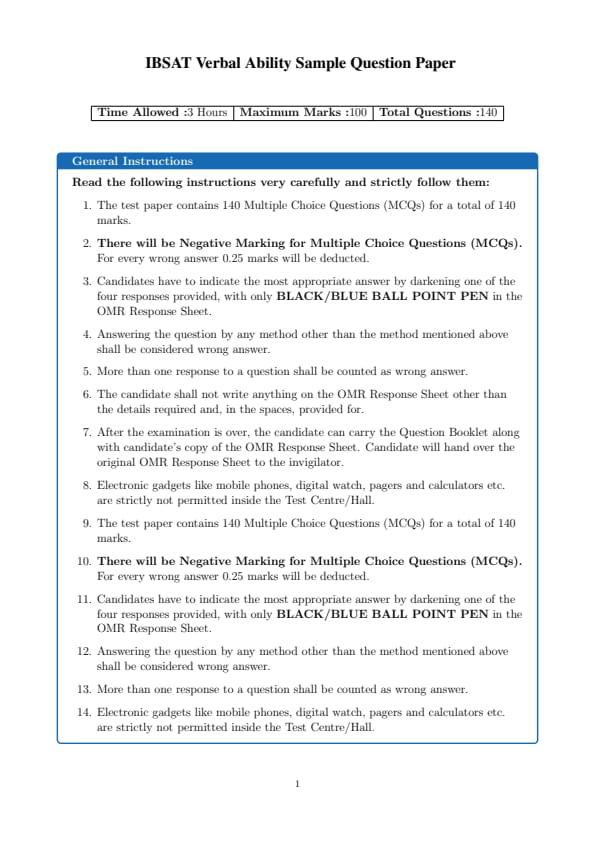
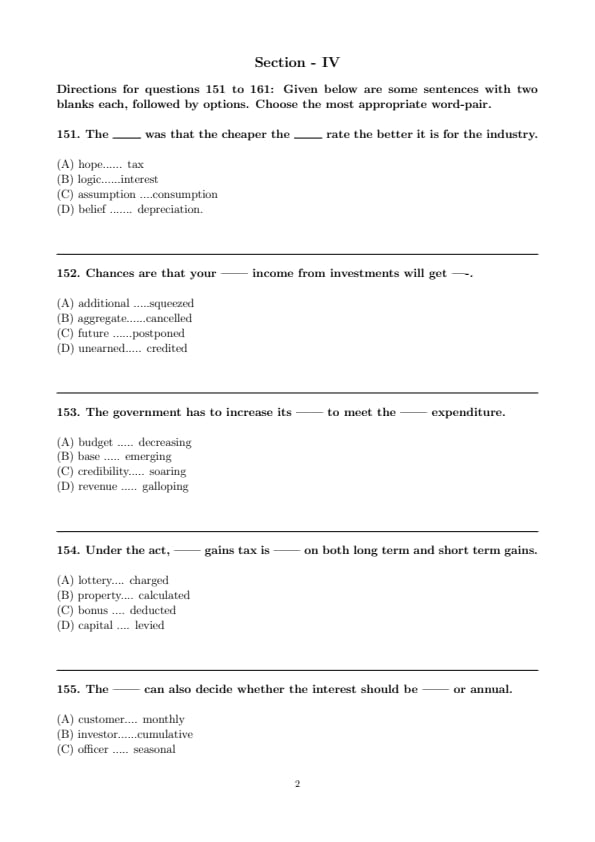
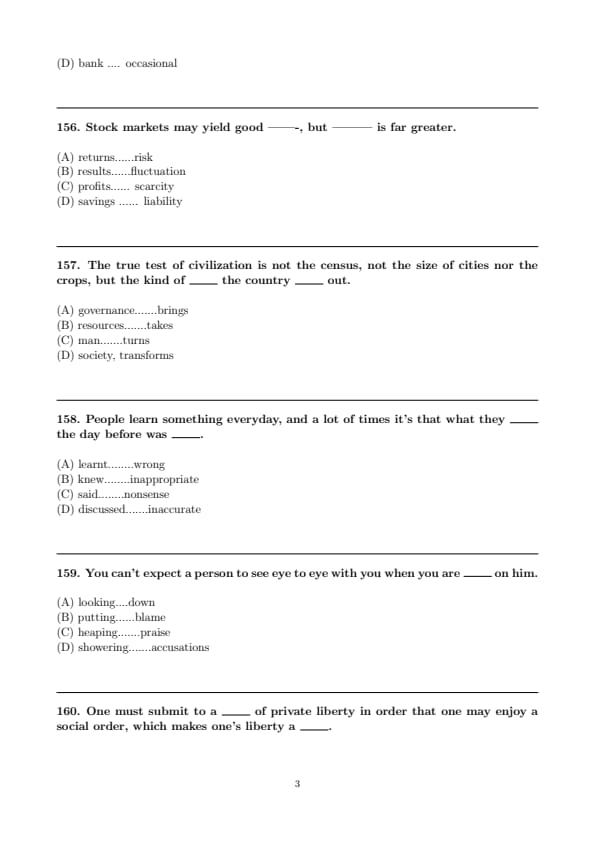
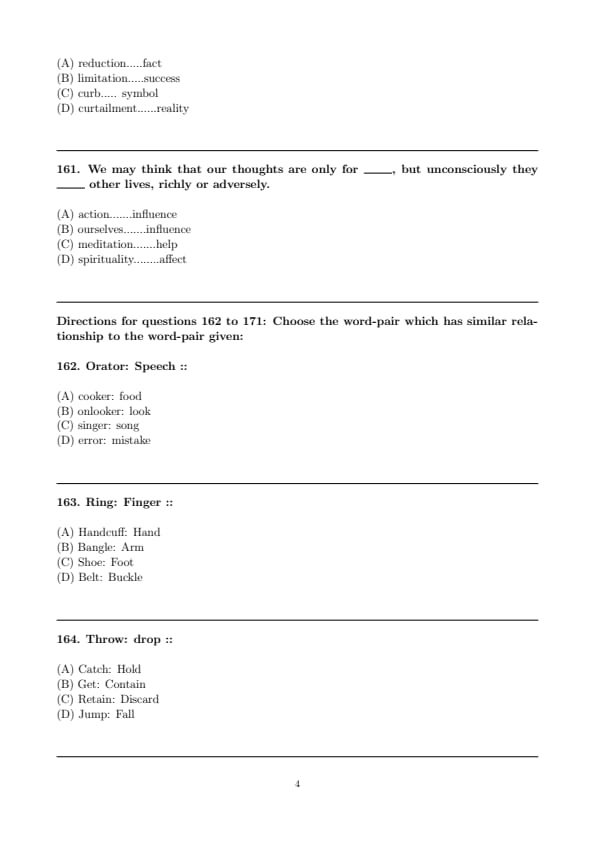
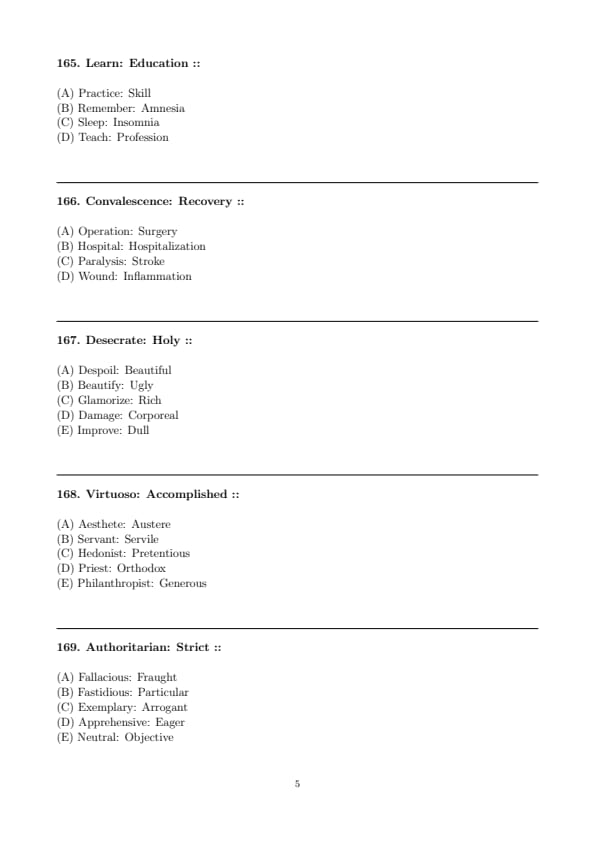
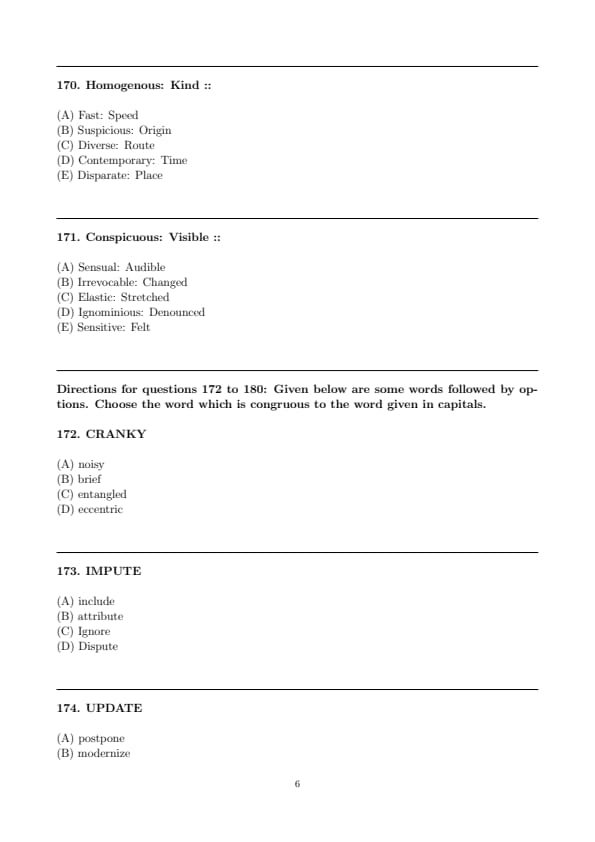
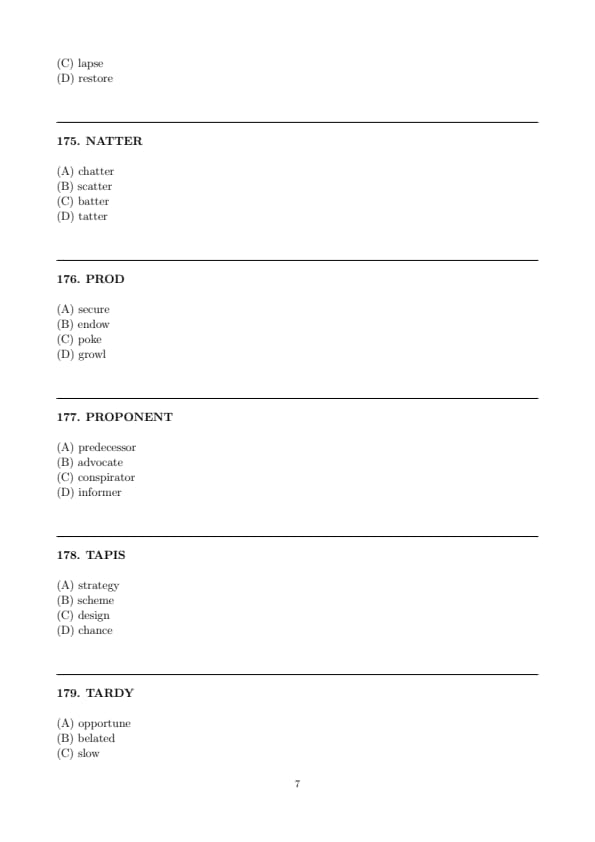
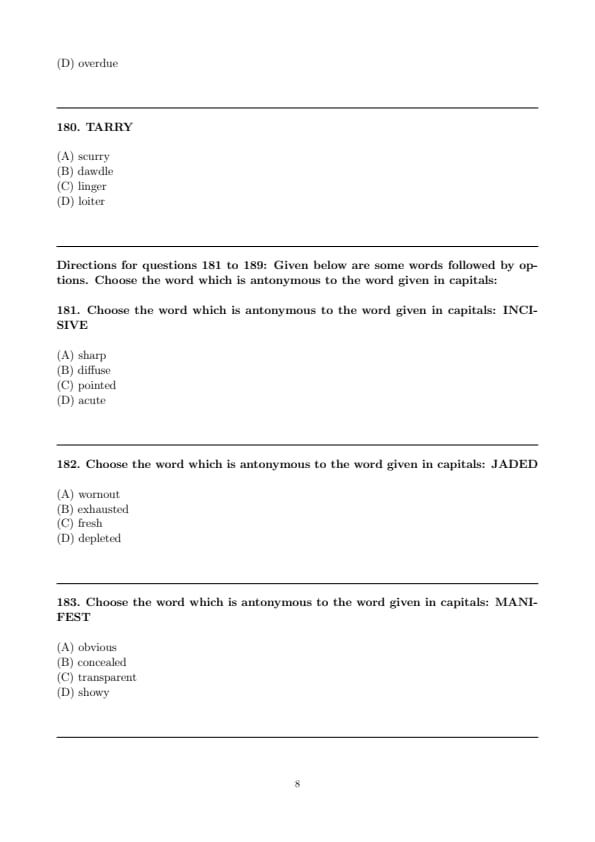
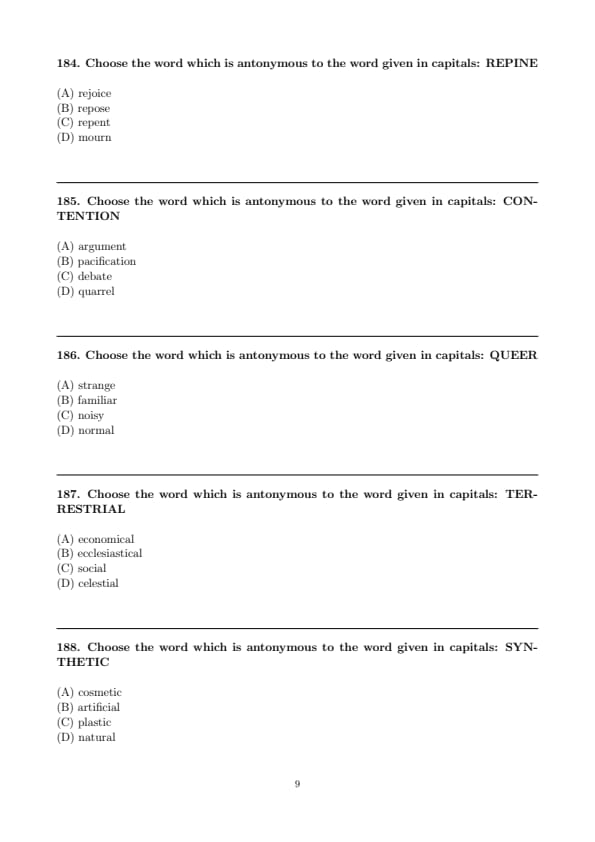
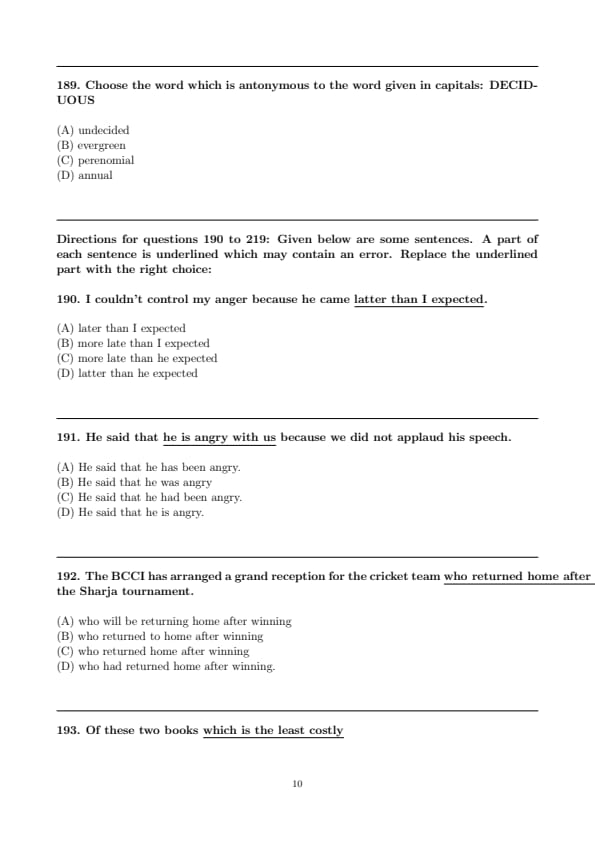
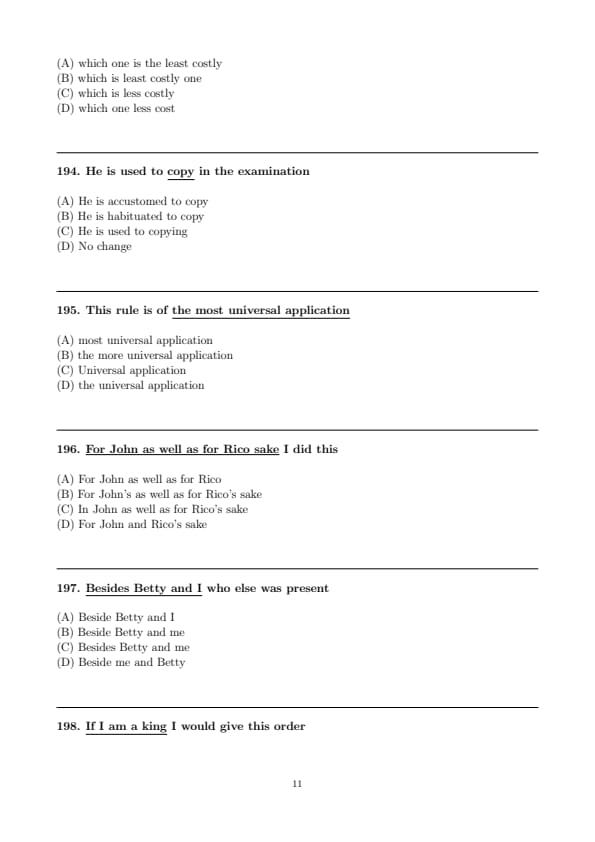
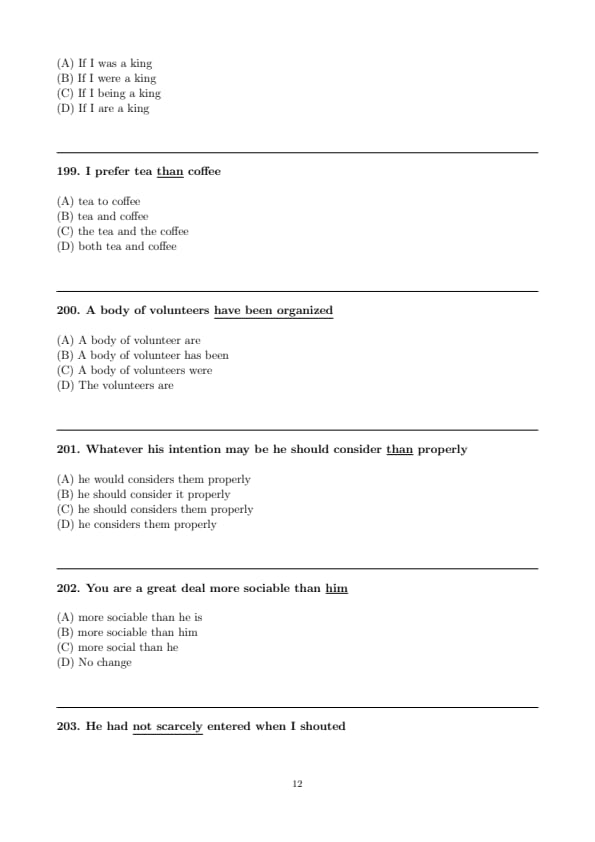
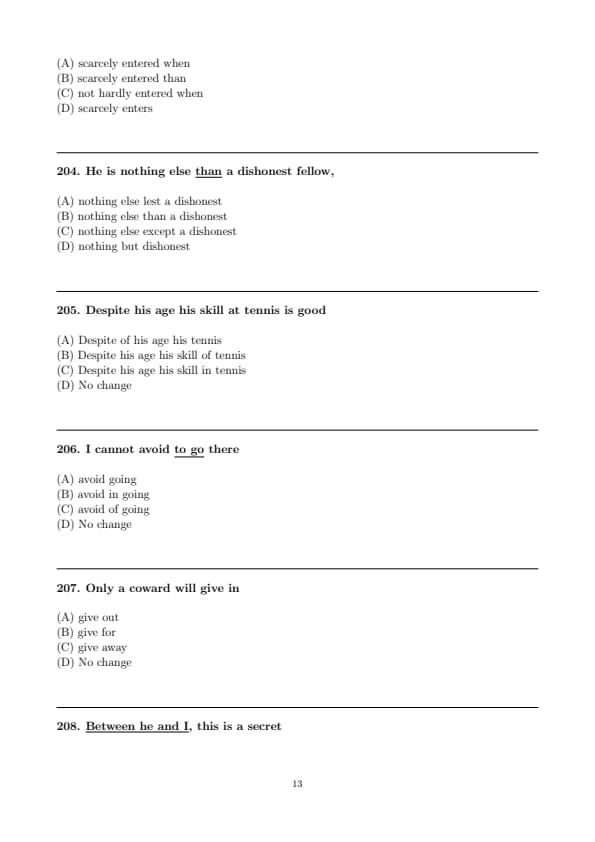
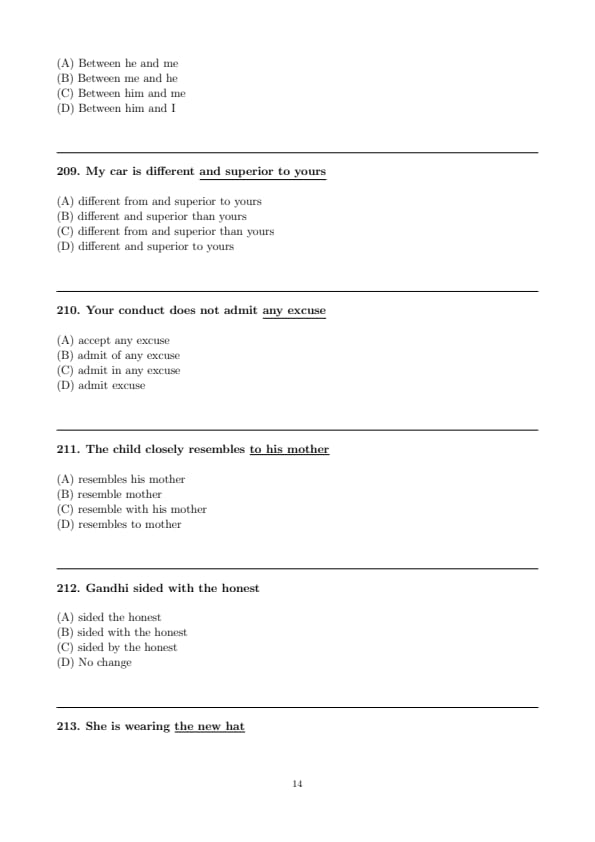
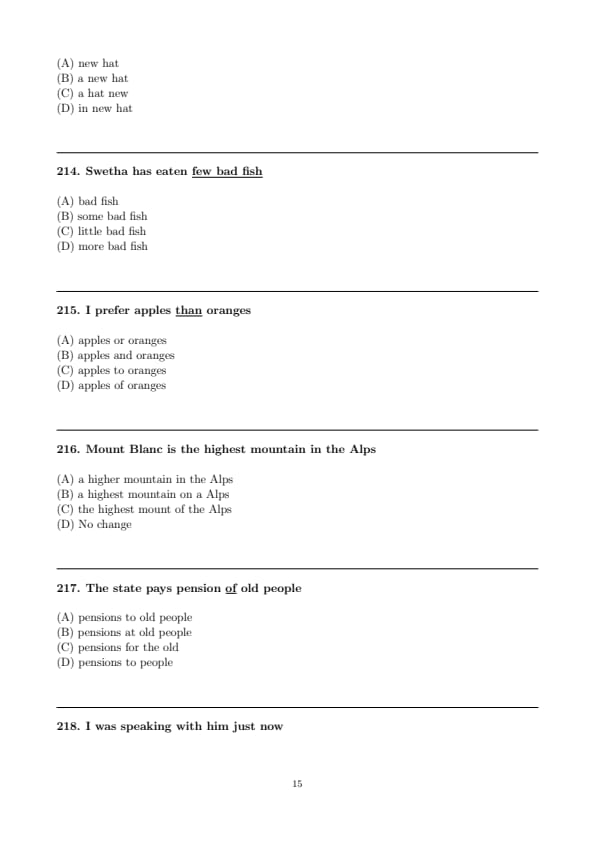
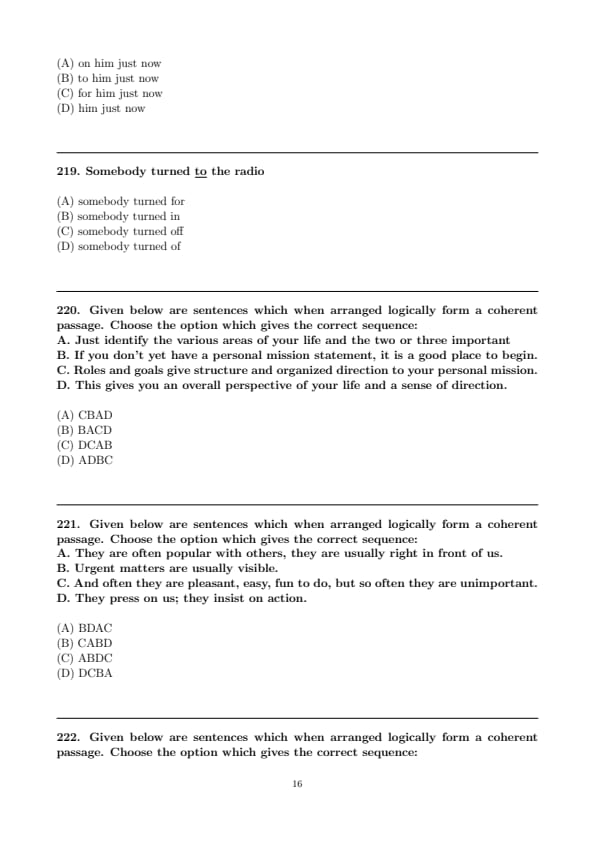
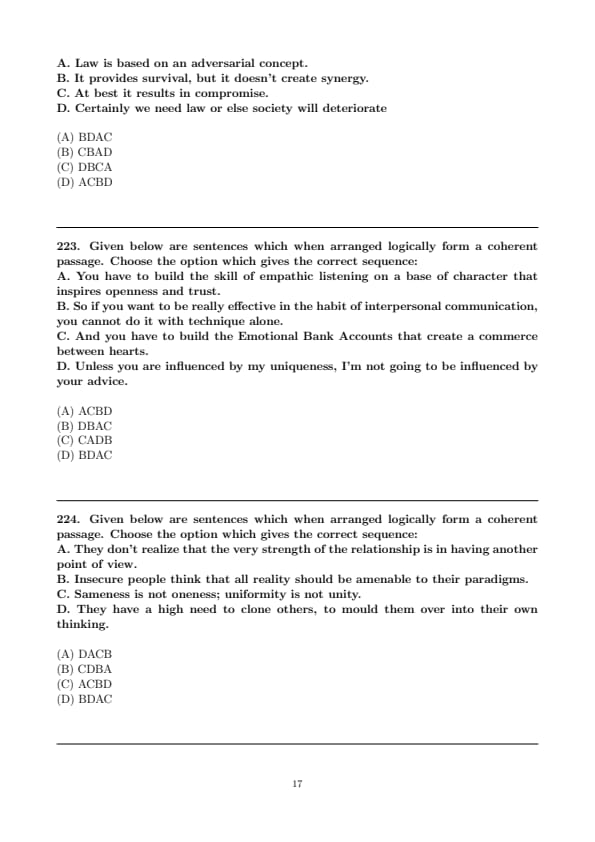
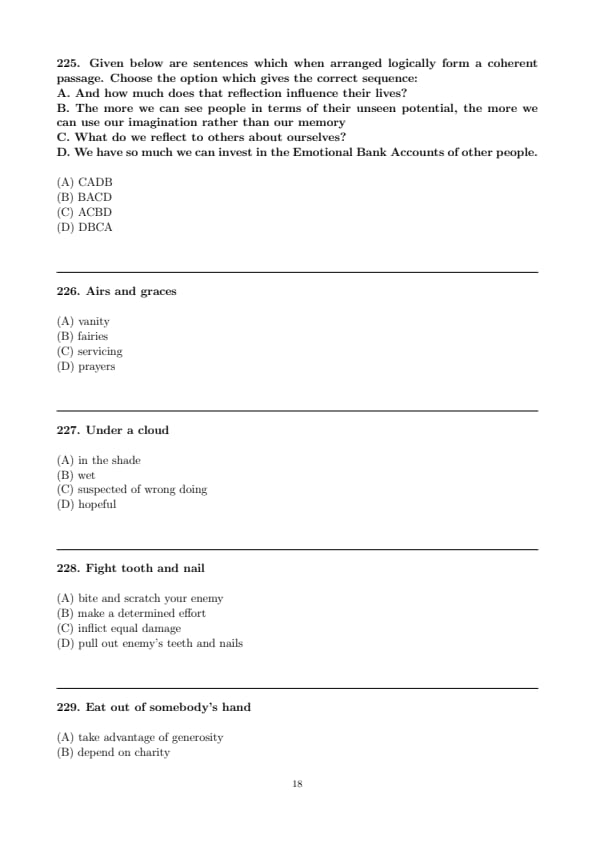
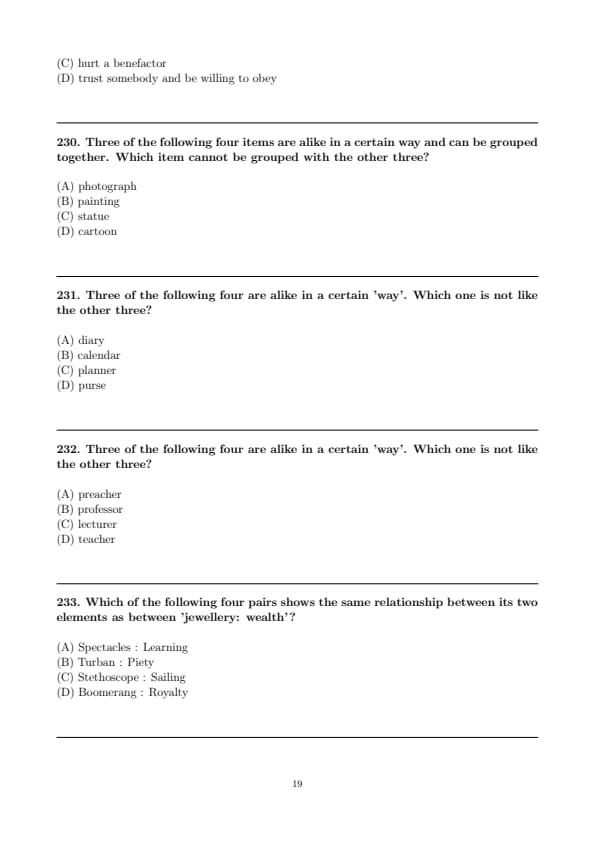
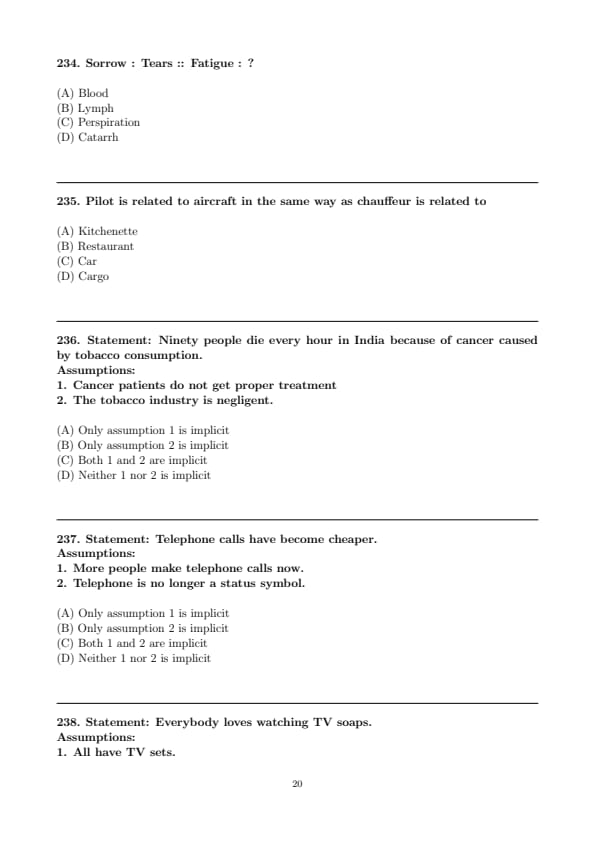
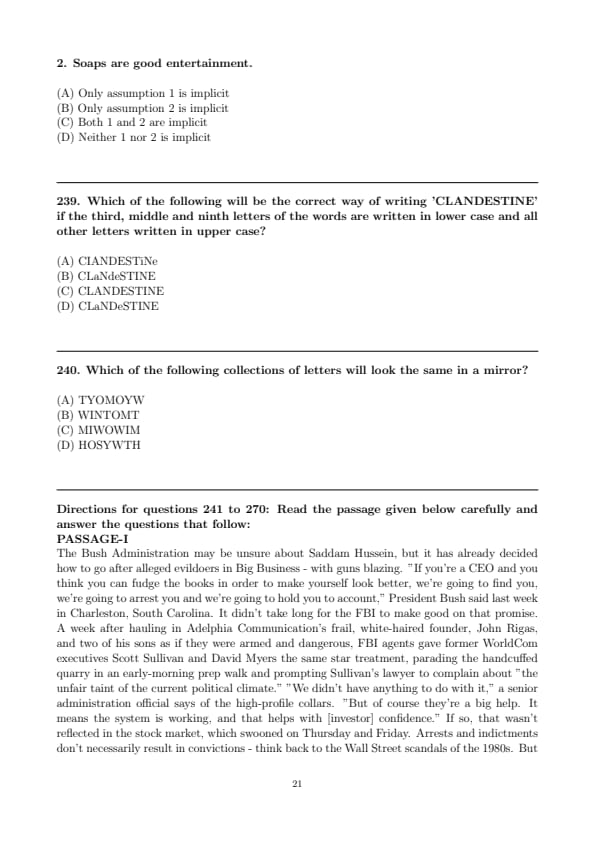
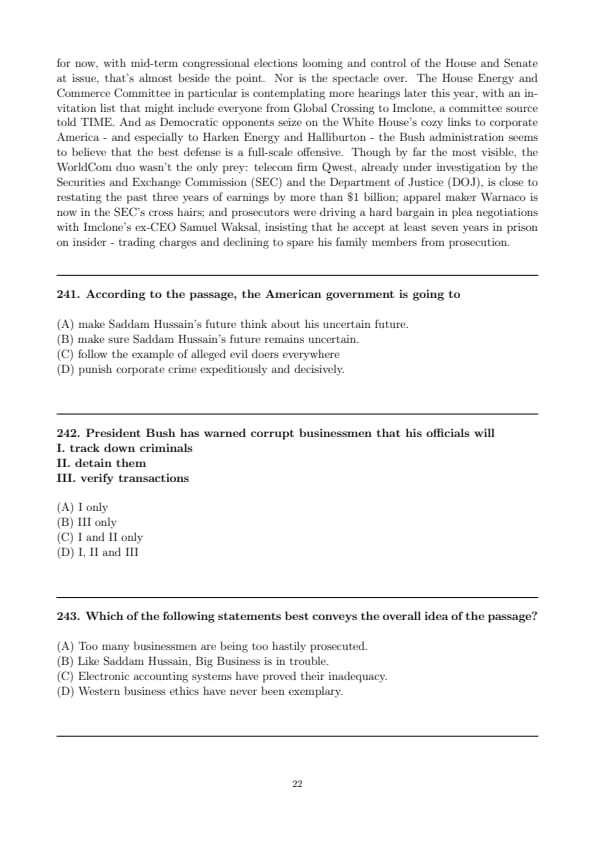
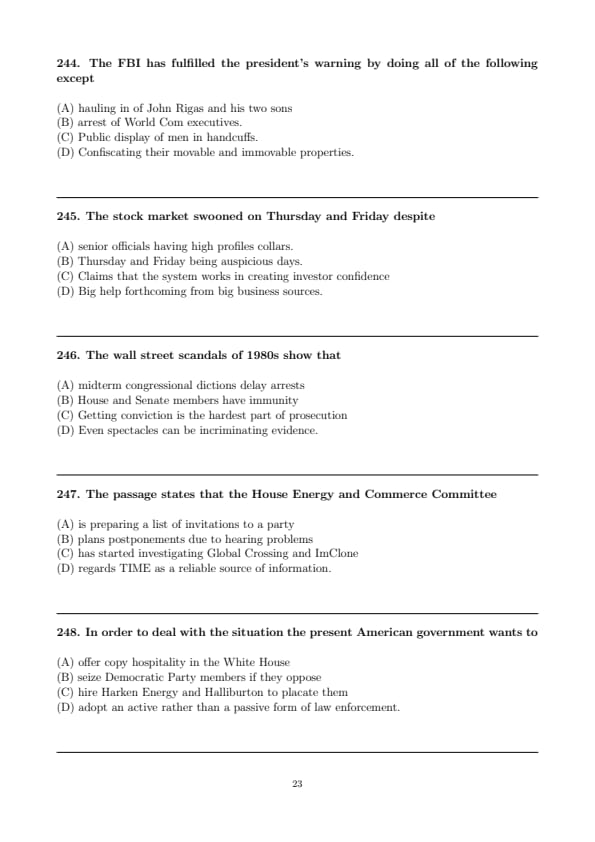
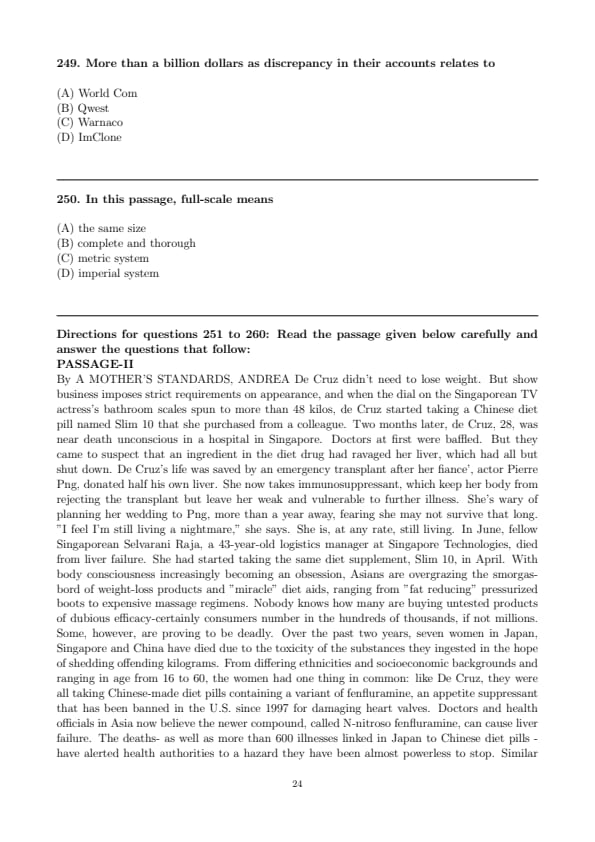
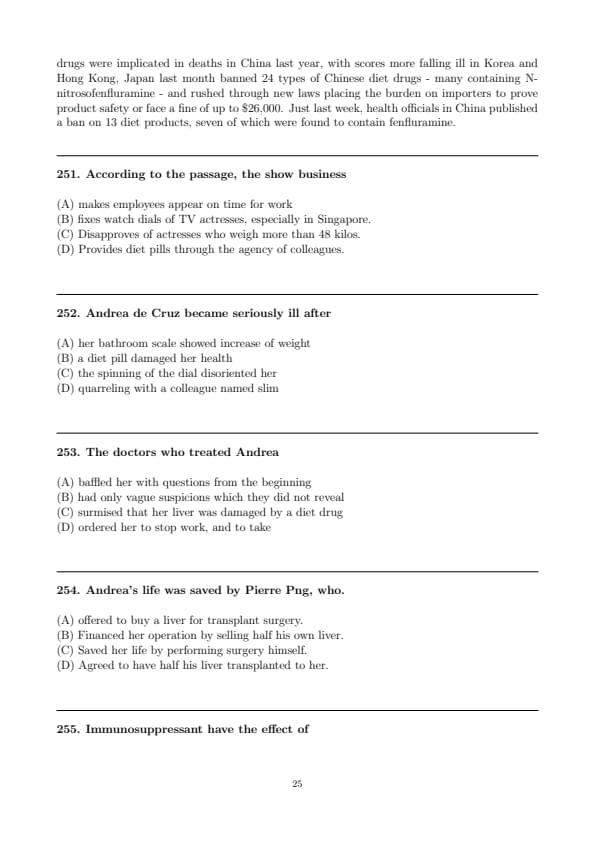
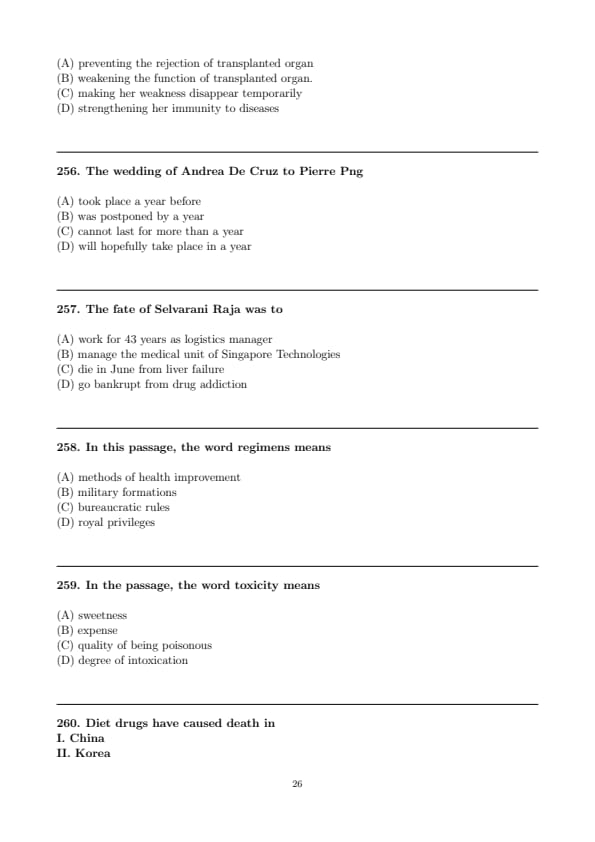
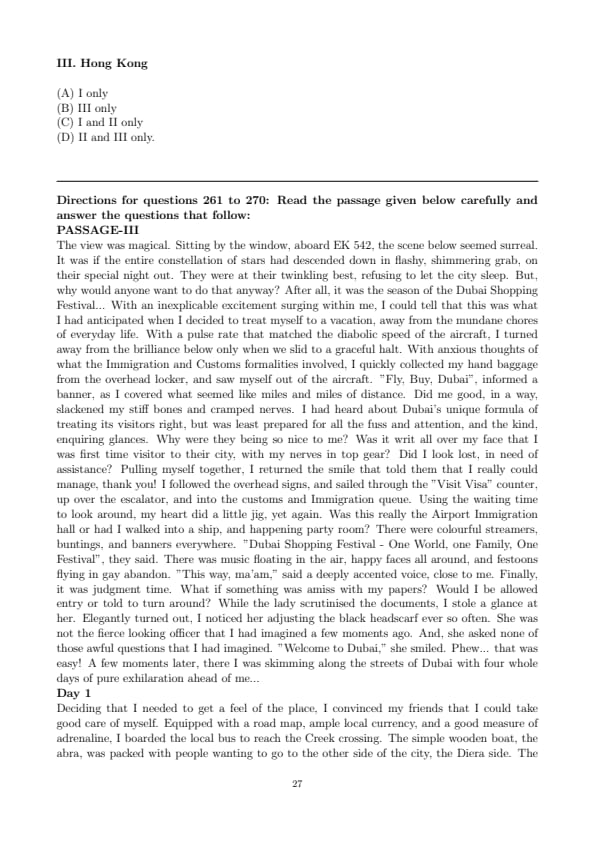
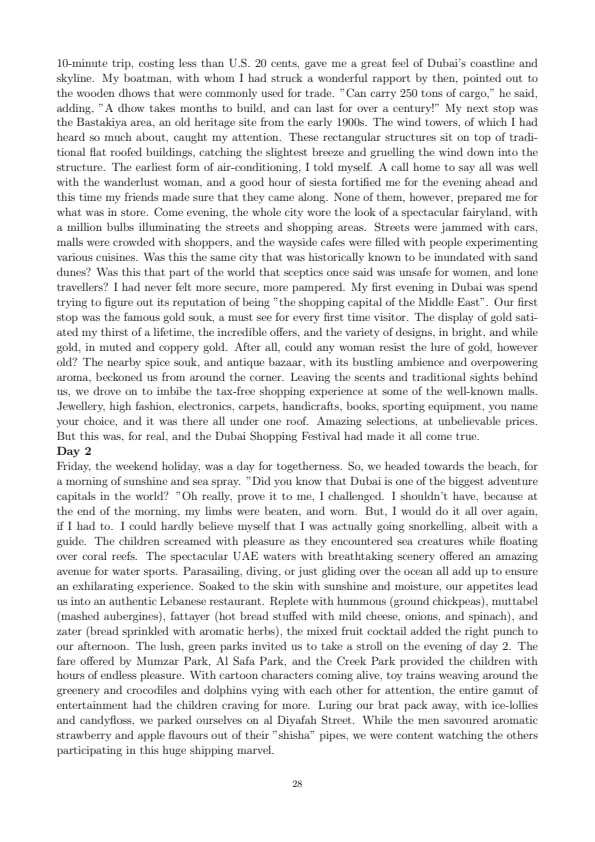
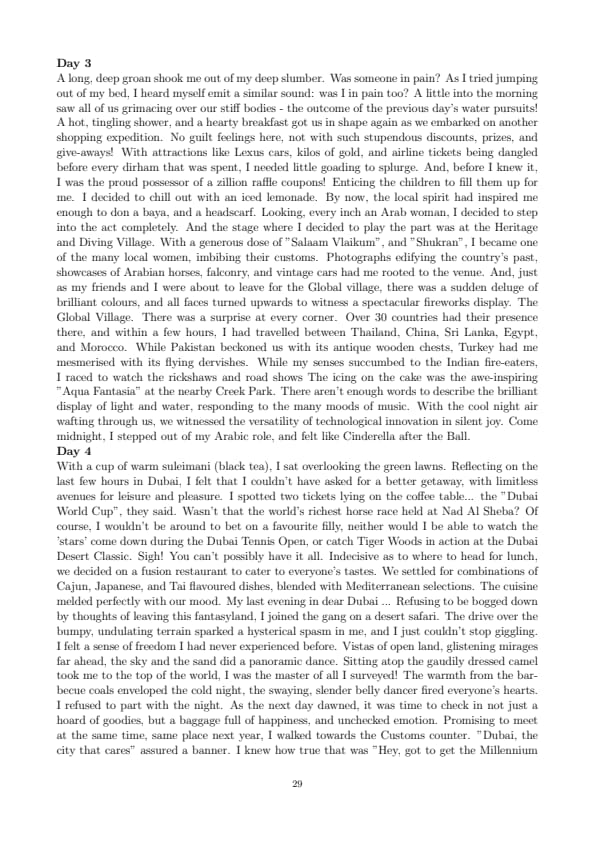
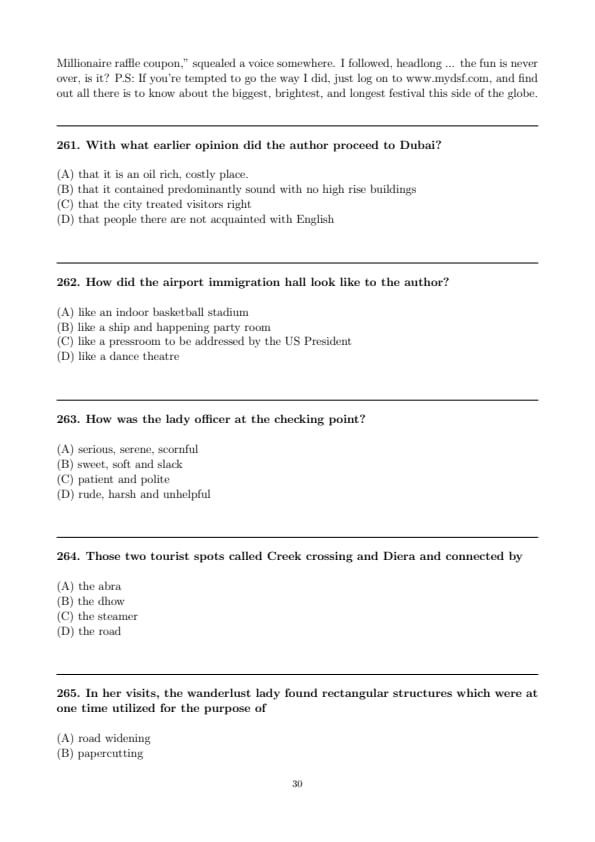
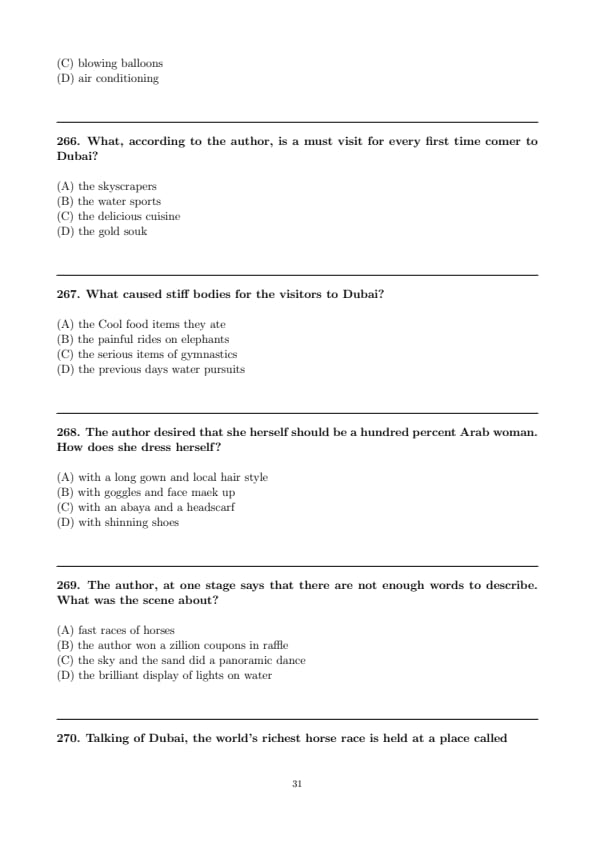





Comments